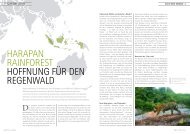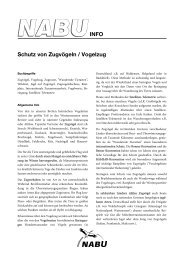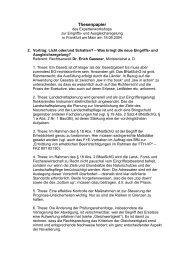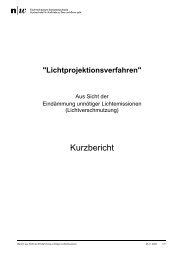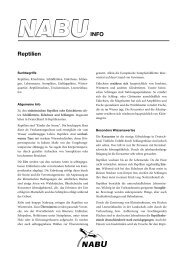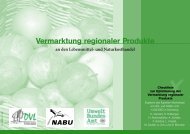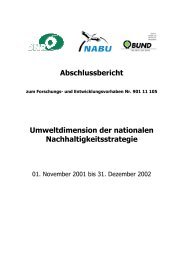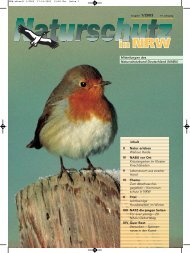Studie "The GMO-emperor has no clothes" (engl.) - Nabu
Studie "The GMO-emperor has no clothes" (engl.) - Nabu
Studie "The GMO-emperor has no clothes" (engl.) - Nabu
Create successful ePaper yourself
Turn your PDF publications into a flip-book with our unique Google optimized e-Paper software.
to trade barriers being lifted — between 1997<br />
and 98 and 2004 and 2005, India imported 115<br />
lakh bales, more than three times the amount<br />
imported in the preceding 25 years.<br />
Discrediting Scientists Opposing <strong>GMO</strong>s<br />
A<strong>no</strong>ther repeated story told in these reports is one<br />
of scientists being discredited, and in some cases,<br />
dismissed from their jobs, when they speak out<br />
about <strong>GMO</strong>s. Often when these scientists begin<br />
GM-related research, they are <strong>no</strong>t opposed to the<br />
tech<strong>no</strong>logy. But their findings reveal reasons to<br />
be concerned about the impact of <strong>GMO</strong>s on food<br />
safety, public health, and the environment.<br />
Dr. Arpad Pusztai, a world re<strong>no</strong>wned scientist,<br />
was one of the first victims of a smear campaign<br />
that eventually resulted in him being forced to<br />
leave his post as director of the Rowett Research<br />
Institute. In 1997, Dr. Pusztai and his wife<br />
and colleague, Dr. Susan Bardocz, carried out<br />
the first nutrition and toxicological study on<br />
<strong>GMO</strong>s. When he fed GM potatoes to lab rats,<br />
he found that the organs of the rats became<br />
critically damaged and their immune systems<br />
were severely weakened. Days after an interview<br />
with the BBC News in which he discussed his<br />
findings his laboratory <strong>no</strong>tes were confiscated<br />
and he was dismissed from his post. Dr. Pusztai<br />
revealed that the <strong>emperor</strong> had <strong>no</strong> clothes, but<br />
many were <strong>no</strong>t ready to hear this news.<br />
Similarly, Andrés Carrasco, a very well-k<strong>no</strong>wn<br />
and respected professor of embryology at the<br />
Medicine School in the Bue<strong>no</strong>s Aires University,<br />
undertook research that showed a lethal effect of<br />
glyphosate on amphibian embryos. Carrasco was<br />
met with a flurry of accusations by agribusiness,<br />
politicians, some media, and others that his<br />
findings were flawed. However, in this case a<br />
happier ending ensued. After careful review of<br />
his science, some provincial laws were enacted to<br />
regulate the use of glyphosate.<br />
But, the usual response to science that contradicts<br />
safety claims of the biotech industry is retaliatory.<br />
Often corporations providing research funds for<br />
universities and institutes threaten to withdraw<br />
funds if any research on <strong>GMO</strong>s counters their<br />
claims of high yields, reduced pesticide usage,<br />
product safety, or other claims. Such threats<br />
obviously serve as a “chilling effect” and can limit<br />
the scope of science and research.<br />
Warnings From Scientists<br />
Many emerging scientific studies are<br />
demonstrating that GM tech<strong>no</strong>logy can cause<br />
potential serious harms to human health and<br />
food safety, the environment, biodiversity of both<br />
plants and living creatures. This publication<br />
contains reports from scientists who are sounding<br />
the alarm on these troubling aspects of <strong>GMO</strong>s.<br />
David Suzuki, a geneticist by training, reminds us<br />
that throughout history tech<strong>no</strong>logies have been<br />
too frequently advanced without full review. As<br />
one example, in Nazi Germany, geneticist Josef<br />
Mengele held peer-reviewed research grants for<br />
his work at Auschwitz. Suzuki empasizes that<br />
societies should apply the Precautionary Principle<br />
with any new tech<strong>no</strong>logy and ask whether it<br />
is needed and then demand proof that it is <strong>no</strong>t<br />
harmful. Nowhere is this more important than in<br />
biotech<strong>no</strong>logy because it enables us to tamper with<br />
the very blueprint of life.<br />
<strong>GMO</strong>s have been released without a complete<br />
assessment of their effect on public health and<br />
the environment. And, as learned from past<br />
experiences, anyone entering an experiment<br />
should give informed consent. Suzuki concludes,<br />
“That means at the very least food should be<br />
labeled if it contains <strong>GMO</strong>s so we each can make<br />
that choice”.<br />
Scientist Mae Won Ho reports that researchers<br />
at Bristol University have discovered a new<br />
phe<strong>no</strong>me<strong>no</strong>n of horizontal gene transfer. That<br />
is, the spread of GM genes by infection and<br />
multiplication (via a virus) regardless of species<br />
barriers is occuring at a rapid pace.<br />
“New combinations of genetic material are<br />
created at unprecedented speed, affecting species<br />
the most that reproduce the fastest,” she reports.<br />
Won Ho provides great technical expertise and<br />
scientific information detailing this frightening<br />
scenario. Emp<strong>has</strong>izing that this could be the<br />
most serious hidden and underestimated hazard<br />
of <strong>GMO</strong>s, she calls for a global ban on further<br />
environmental releases of <strong>GMO</strong>s.<br />
Hans Herren outlines how the 60-year history<br />
of industrial agriculture’s toxic treadmill of<br />
using ever more potent chemicals <strong>has</strong> damaged<br />
soils, watersheds, biodiversity, as well as<br />
farmer livelihoods. Herren stresses that this<br />
damaging legacy should serve as a lesson and<br />
provide impetus for transitioning to farming<br />
without chemicals. However, instead societies<br />
are increasingly repeating past mistakes by<br />
turning to GM seeds and plants. As weeds and<br />
pests are increasingly building up resistance to<br />
the chemicals used on GM plants, the use of<br />
pesticides <strong>has</strong> increased greatly. Herren also <strong>no</strong>tes<br />
31



